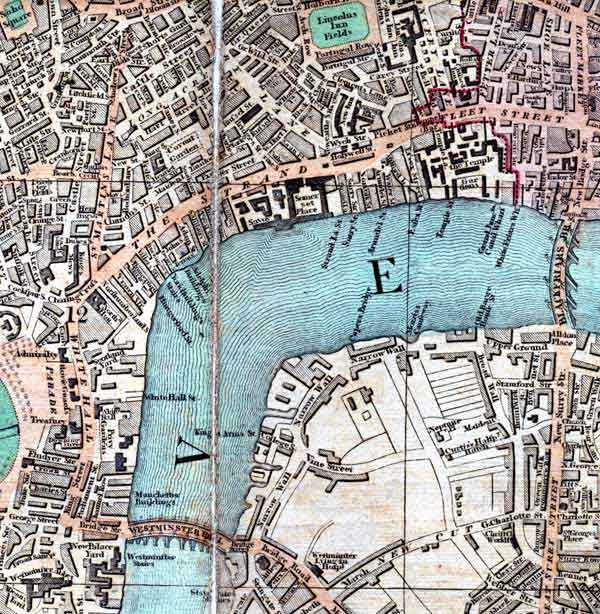A Picture of London for 1802 ; being a Correct Guide to all the Curiosities, Amusements ,Exhibitions ,Public Establishments and remarkable Objects in and near London with a Collection of Appropriate Tables of the use of Strangers , Foreigners and all Persons who are not Intimately Acquainted with the British Metropolis by R Phillips:
This is an immense building stretching from Fleet-street to the River, north and south; and from Lombard-street to Whitefriars, to Essex-street in the Strand , east and west. This place takes its name from its being founded by the Knights Templars in England. The Templars were Crusaders, who, about the year 1118 formed themselves into a military body at Jerusalem and guarded the roads, for the safety of pilgrims. In time the order became very powerful. The Templars in Fleet-street in the thirteenth century frequently entertained the king ,the pope's nuncio, foreign ambassadors and other great personages.
The Temple afterwards passed to the Knights Hospitallers of St John of Jerusalem who has their chief house in England in Clerkenwell on the site of St John's-square. They shortly granted the Temple for £10 per annum rent to the students of the common laws of England in the possession of whom and their successors, it has remained.
It is now divided into two societies of these students called the inner and middle Temple and having the name of Inns of Court.
These societies consist of Benchers, Barristers and Students. In term they dine in the hall of the society which is called "Keeping Commons". To dine a fortnight in each term is deemed "Keeping the Term"; and sixteen of these terms qualifies a student in the Inner Temple to be called to the bar, that is to be entitled to plead and manage causes for clients. In the Middle Temple the number of terms necessary to qualify a student for the bar is twenty eight.
Antiently the society used their bread as plates; and they drank out of wooden cups. At present their customs are very simple but their fare is extremely good, although plain, and restricted to certain kinds for each day. There is no wine allowed the students but they are permitted to find wine for themselves .The Benchers drink excellent wines; are unrestricted in fare; and live very well which these societies can perfectly afford, being extremely wealthy.
The Temple is an irregular building . In Fleet-street are two entrances, one to the Inner and the other to the Middle Temple. The latter has a front in the manner of Inigo Jones, of brick, ornamented with four large stone pilasters of the Ionic order with a pediment. The garden of the inner Temple is not only a most happy situation but is laid out with great taste and kept in most perfect order. It is chiefly covered with green sward, which is pleasing to the eye, especially in a city and is most agreeable to walk on. It lies along the river ; is of great extent , and has a spacious gravel walk, or terrace, on the water's edge . It forms a crowded promenade in the summer; and at such time is an interesting spot.
The Middle Temple has a garden, but much smaller and not so advantageously situated. The Hall of the Middle Temple is a spacious and elegant room, in its style. Many great feats have been given in its old times. It is well worth a visit.
The Temple Church belongs in common to the two societies. The Knights Templars built their church on this site; but that was destroyed and the present edifice was erected by the Knights Hospitallers.
Use the "Show me" link to locate The Temple on the map. You may need to scroll down to see The Temple highlighted.


 Chapter 21
Chapter 21 
